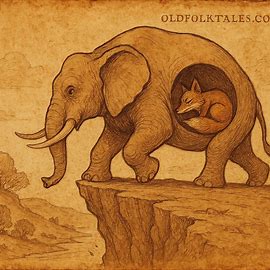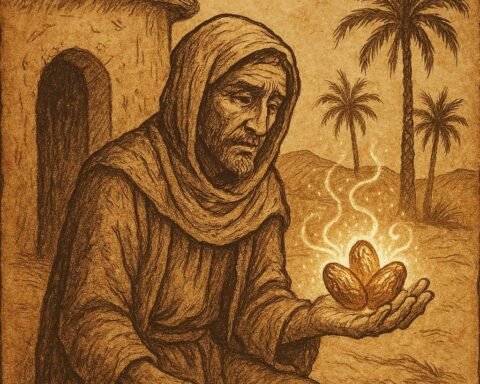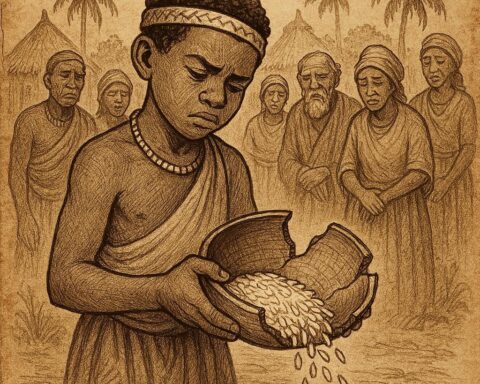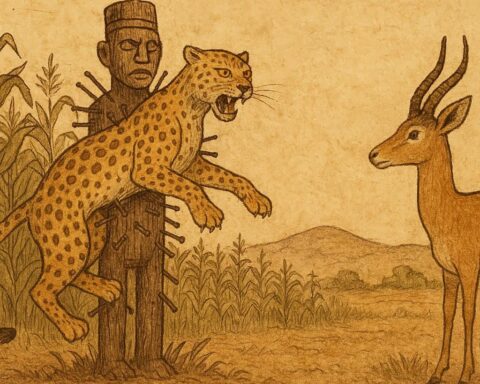Long ago, in the highlands of Eritrea, where the Tigrean people passed down wisdom through firelit tales, a fox once set out on a journey with an elephant. Before they began, the elephant turned to his small companion and asked, “Where are you going, fox?” The fox, quick-tongued as always, replied, “I am going with you.”
The elephant, strong and steady, shook his great head. “Stay behind. You cannot endure hunger or thirst on this path.” But the fox was stubborn. “I can endure it. I will not trouble you with complaints of hunger or thirst.” The elephant sighed but agreed. Together, they set out, walking under the sun across dry country.
By the end of the first day, the fox’s bold promise weakened. He whimpered, “Uncle, I am thirsty.” The elephant turned his wise eyes upon him. “Did you not say you would not be thirsty? What is this now?” Ashamed yet desperate, the fox answered, “I did not know we would pass through such a dry land.” The elephant directed him to a water-pit. “Go and drink, then return.” The fox went, drank deeply, but then filled the pit with earth. When he returned, he lied, “It was already filled up.”
They continued their march until again the fox complained, “Uncle, I am thirsty.” Patiently, the elephant sent him to another well. Again, the fox drank, then blocked the well and returned with a lie. This happened a third time, the fox spoiling every well they passed.
At last they entered a land unfamiliar to the elephant. When the fox cried out again for water, the elephant admitted, “I do not know the wells here. But there is water within me. Enter through my body, drink, and come back exactly the way you entered.” Desperate, the fox obeyed, creeping inside the elephant’s body and drinking from the water within. He returned safely and, for a while, kept his promise.
READ THIS: The Hen That Found Her Own Doom: A Tigrean Folktale That Teaches Lessons on Fate and Folly
But greed stirs even where thirst is quenched. On his next journey inside, the fox noticed the elephant’s fat swinging within his belly. His hunger overpowered him. He tore off a piece of fat and ate. The elephant felt the pain and groaned, “Fox, may you be cursed! How could you betray me?”
The fox, pretending ignorance, refused to leave. Each time the elephant offered him a way out, through the same entrance, through the mouth, foot, ear, or trunk, the fox mocked him. “Shall I be soiled with dung? Crushed by tusks? Squashed underfoot? Soiled by earwax? Seized by your trunk?” On and on, he refused.
At last, furious and desperate, the elephant declared, “If you will not come out, then I shall throw myself down this precipice and end us both.” The fox laughed, “Do as you wish! Throw yourself down.” Enraged, the elephant hurled himself from the cliff, breaking all his bones. But just before the crash, the fox escaped through the same way he had entered.
The elephant lay dead, and the fox dragged out his entrails. While unrolling them along the ground, he met traveling merchants. Among them was his cousin. “From where do you come, fox?” asked the cousin. Boasting, the fox told him of the elephant’s fall. The merchants eagerly followed the entrails to claim the carcass, leaving their skins of butter behind. The fox stayed to watch their goods.
Once alone, the fox slit the skins and drank their butter, filling the emptied skins with filth. Only his cousin’s he spared. When the merchants returned, he praised them and even demanded, “Make me a butter-sauce from my cousin’s skin; my aunt’s butter I know, it is always good.” They obeyed. The fox ate well and slipped away.
When the merchants reached town and opened their skins to sell, they found nothing but excrement, save the cousin’s, which remained pure. Realizing the fox had tricked them, they pursued him. But the fox hid among his kin. To expose him, they set up a spear and commanded all foxes to leap over it. The guilty fox, heavy from butter, could not leap. They seized him and tied him to a tree, vowing to scourge him.
As they left to gather switches, a jackal came by with his few goats. Seeing the bound fox, he asked, “What has happened to you?” The fox spun another lie: “My family wanted to make me their chief, but I refused. They tied me here until I accept. If you desire the chieftainship, untie me. Take my place and when they beat you, say, ‘I will be chief!’”
The jackal, tempted, untied him. The fox tied the jackal in his place and escaped with his goats and harp. When the merchants returned, they beat the jackal, who cried out, “I will be chief!” Realizing they had been tricked again, the merchants freed him, but the fox was gone beyond their reach.
Moral Lesson
This Tigrean folktale from Eritrea teaches that greed and deceit, though clever for a time, eventually lead to ruin and mistrust. The fox gained water, fat, butter, goats, and safety through lies and betrayal, but left behind broken trust and anger wherever he passed. True wisdom lies not in trickery, but in honesty and restraint. Those who destroy others for gain may survive for a while, but in the end they stand alone, hunted by those they wronged.
Knowledge Check
Who traveled together at the beginning of the tale?
A fox and an elephant.
How did the fox trick the elephant at the wells?
By drinking, then filling them with earth and claiming they were empty.
What did the fox eat inside the elephant’s body?
The fat swinging in the elephant’s belly.
How did the elephant die?
He threw himself from a precipice with the fox inside.
What trick did the fox play on the jackal?
He convinced him to take his place tied to the tree, then stole his goats and harp.
Where does this folktale originate?
It is a Tigrean folktale from Eritrea.
Source: Tigrean folktale, Eritrea.






